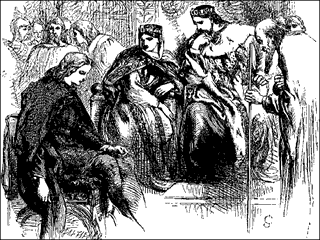
The Political Malcontent
|
The second type of melancholic is the political or malcontent. He was fairly common, though his feelings were seldom expressed, at least by himself, in print. As his name implies, he was one who could find no place in the social system, and he often joined one of the extreme sects, either Catholic or Puritan. Most of the malcontents came from Universities, for, as Bacon observed,
a common cause of sedition is "when more are bred scholars than
preferment can take off." |
 |
Francis Bacon becomes the spokesman for the popular theory that ambition, once frustrated, turns inward and inflicts damage on the ambitious person. Biologically, it was believed that when the humor, choler (yellow bile,) is excessively heated, it becomes black bile, the humor of melancholy. In effect, a useful energy is transformed into a sickness. Bacon uses the term "adust" to describe this transformation.
|
Of Ambition Ambition is like choler, which is an humour that maketh
men active, earnest, full of alacrity, and stirring, if it be not
stopped. But if it be stopped, and cannot have his way, it becometh
adust, and thereby malign and venomous. So amtitious men, if they
find the way open to their rising, and still get forward, they are
rather busy than dangerous; but if they be checked in their desires,
they become secretly discontent and look upon men and matters with
an evil eye, and are best pleased when things go backward, which is
the worst property in a servant of a prince or state. |
As John Dover Wilson has observed, much of the second and third acts of Hamlet are devoted to a double process of sifting. Hamlet is attempting to "sift" out Claudius, and Claudius is trying to assess Hamlet's state of mind. Thus, while Hamlet is trying to assess the validity of the ghost's story, a comedy is played out in which the King and Polonius, with the aid of Rosencrantz and Guildenstern, try to evaluate Hamlet's 'antic disposition.' As we have seen, Polonius is the principal advocate of the theory that Hamlet's disposition is the result of unrequited love, and the meeting with Ophelia is set up as a laboratory to test that theory. The King's suspicions are more political, and he employs Rosencrantz and Guildenstern to look into the notion of thwarted ambition as a cause. They serve not only as his spies, but also give voice to his suspicions.
| HAMLET: Let me question more in particular. What have you, my good friends, deserved at the hands of Fortune that she sends you to prison hither? GUILDENSTERN: Prison, my lord? HAMLET: Denmark's a prison. ROSENCRANTZ: Then is the world one. HAMLET: A goodly one, in which there are many confines, wards, and dungeons, Denmark being one o' th' worst. ROSENCRANTZ: We think not so, my lord. HAMLET: Why, then 'tis none to you, for there is nothing either good or bad but thinking makes it so. To me it is a prison. ROSENCRANTZ: Why, then your ambition makes it one; 'tis too narrow for your mind. HAMLET: O God, I could be bounded in a nutshell and count myself a king of infinite space, were it not that I have bad dreams. GUILDENSTERN Which dreams indeed are ambition; for the very substance of the ambitious is merely the shadow of a dream. HAMLET: A dream itself is but a shadow. ROSENCRANTZ: Truly, and I hold ambition of so airy and light a quality that it is but a shadow's shadow. HAMLET: Then are our beggars bodies, and our monarchs and outstretched heroes the beggars' shadows. Shall we to th' court? For, by my fay, I cannot reason. II.ii.242-270 |
With regard to the notion that frustrated ambition turns into melancholy, Hamlet ends by making a mockery of Rosencrantz' and Guildenstern's supposition.
ROSENCRANTZ: Good my lord, what is your cause of distemper? You do surely
|
* "While the grass growety, the horse starveth."